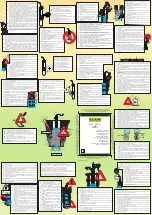
E - CONNECTING TO MANOMETER
E.1 -
At this point, after the ALDP test, the interstice should still be holding vacuum. Maintain 20”
of Vacuum and
slowly
open ball valve to let fluid into the interstice until it exits the venturi assembly.
Visually check whether the fluid level reaches the top of the interstitial space.
E.2 -
Cut the barb & ball valve assembly free by cutting the tubing just below it and
connect
open
end of tubing to the bottom of the primary Manometer.
E.3 -
Remove the Barb,
Tubing & Combination gauge assembly from the test port fitting on the
side of the sump.
Install a threaded pipe plug
into the open test port fitting and adjust Primary
manometer bracket so the manometer is in a position clear of the sump cover.
Remove Entire Gauge
Assembly by backing
off threaded barb fitting.
Cut off barb
& ball valve
assembly.
Install PVC Plug
Connect Tubing to
Primary Manometer
P-Traps OK since vacuum fill
method leaves no room for air.
E.4
-
It is not uncommon for some interstitial fluid to be lost while connecting the tubing to the primary
manometer. This is ok. Replace lost fluid by topping off manometer with interstitial fluid until the liquid level
reaches just 2 inches below the top of manometer.
E.5 - Hydrostatic Field Integrity Test -
Mark the date and time of test and
manometer level.
Allow 1 hour to look for a change in level.
No change in level or visible leaking means
box passes test.
E.6 -
If interstitial test fluid changes its level more than 1/4”, visually look for any signs of leaking around
fittings both interior and exterior to sump. Pay special attention to field installed fittings.
E.7 -
If interstitial monitoring is required, install a California Listed Hydrostatic Sensor (LG-113) using the
sensor manufacturer’s fitting. Run sensor cable through the cap assembly
(see Fig. E.7)
. Level sensor
should be set to bottom of manometer. Follow your leak detector manufacturer’s installation instructions.
Cover the manometer with cap and fasten with wire and lead crimp seal.
Continuous Monitoring
Interstitial & Leak
Detection of Secondary
Containment
Sensor Cable
Cap assembly
Fig. E.7
11
ii-B409-DW-10A






























